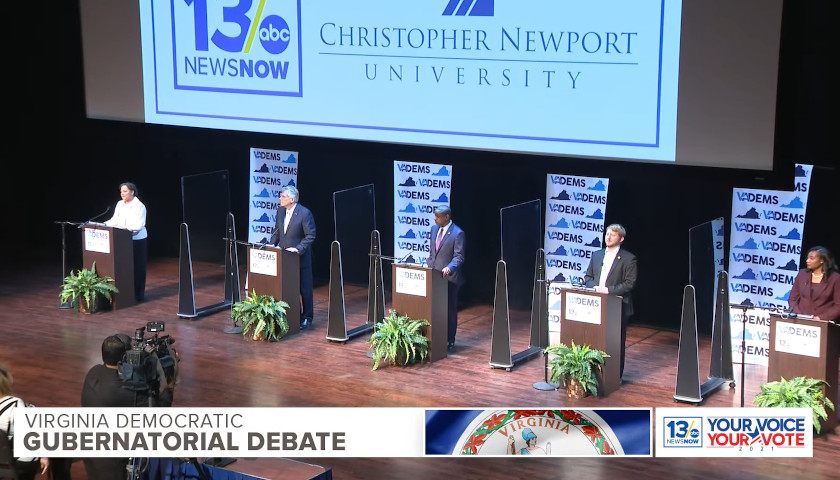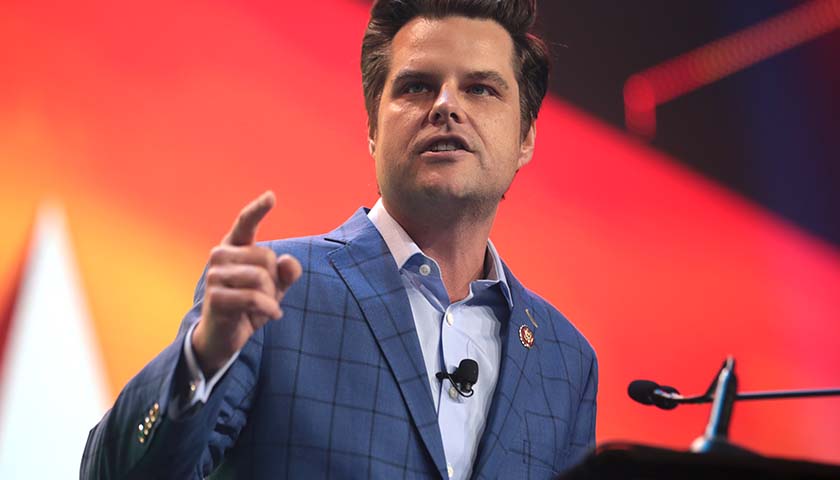The final day of voting in the Democratic primary is June 8, less than a week away. On Tuesday evening, the gubernatorial candidates met for a final debate where they discussed issues including criminal justice reform, educational policy, and health care. One moment during the debate was sparked when moderators directed a question to Terry McAuliffe, and several of his opponents used rebuttal opportunities to weigh in on the post-Trump future of the Democratic Party of Virginia.
A moderator cited Governor Ralph Northam’s early endorsement of Terry McAuliffe: “In so doing, did he stifle an important debate as to whether the establishment wing of your party needs to give way to the progressive movement?”
McAuliffe said he didn’t worry about labels and cited his record on job creation, addressing Virginia’s deficit when he first took office, and expanding Medicaid. He said, “And I remind you, Glenn Youngkin is against Medicaid expansion.”
Delegate Lee Carter (D-Manassas) responded, “We have heard I believe in every single question response from the former governor, we’ve heard Glenn Youngkin’s name or Donald Trump’s name in every single one of them.”
Carter said the debate was supposed to be about the future of Virginia and what the candidates stand for.
He said, “This is the first opportunity for the Democratic Party to define what it is going to be after Donald Trump is gone, and he is gone. So we can’t just be a party that is opposed to the other guys. We have to fight for something.”
McAuliffe pointed to his campaign website. He said, “I have more policy proposals up than all the people on this stage. I have 131 pages. 14 very specific proposals of what I will do and how I will pay for them. And when I was governor, I put every one of my campaign promises on my website with little check marks. So if I tell you I’m going to do something, I promise I will do it.”
Jennifer Carrol Foy asked why McAuliffe deserved a second chance.
“As if he didn’t have an opportunity to do all the things he said he was going to do, to be big and bold,” Foy said in her rebuttal. “We have an option to elect an inspiring leader who will galvanize our base. This is an opportunity for Virginia to build more coalitions and not less, and I can tell you Virginians deserve better than Glenn Youngkin and Terry McAuliffe at the top of the ticket, two wealthy out of touch millionaire politicians who don’t understand the challenges Virginians face.”
Senator Jennifer McClellan (D-Richmond) also chose to rebut: “You know what I hear every day from Virginians who have lost faith in their government’s ability to solve problems? I hear that their vote doesn’t matter, that no one is listening to them.”
She said, “For the past 15 years I have taken what I have heard out in the communities all across this commonwealth and put it into action. That is what people are looking for in the next governor. That is what people are looking for in the next leader of this party who will invest in the party everywhere in a true coordinated campaign that leaves no Virginian and no part of Virginia behind.”
The debate ended with a question about what is needed to enable more Virginians to have hope and safety.
Foy said, “In order for people to know that their quality of life will improve is to be sure that you elect a governor who understands.”
“Most of us have the legislative success but I have the lived experience,” Foy said, citing her struggles with expensive healthcare and living in red-lined communities.
She said, “I will put forth intentional policies to uplift our communities in a real way.”
McClellan said, “I have a deep understanding of the history of our commonwealth and our country and how the legacy of slavery and Jim Crow did not go away with a magic wand when laws changed. We have to intentionally dismantle the legacy of slavery and Jim Crow in Virginia.”
She said that includes education in schools and public settings “Because people’s policy positions are based on their perspectives.”
Carter said economic power was critical.
“That begins with reparations for Virginia’s complicity in some of the worst crimes in human history from the genocide of Native Americans to the transatlantic slave trade,” he said. “But it also means taking on Wall Street and making sure people have not just jobs, but businesses that they own and that they operate and are pillars of their community. Economic power is the base of justice.”
McAuliffe highlighted his plan for lifting up Black Virginians that includes access to capital, microloans, and home ownership. He said, “But the key, core question for us is, we have a racist system when we have unequal schools. Pay our teachers above the national average for the first time ever. Get the 40,000 at risk three- and four-year-olds, get them pre-K. Get every child online here. When we do that we will begin to lift up all Virginians.”
Lieutenant Governor Justin Fairfax said racism occurs when people are treated differently and have different life outcomes because of the color of their skin. He said, “We see that throughout almost every aspect of our society and I think it also bears mentioning here: we promote diversity.
Fairfax said, “I think it’s very important and it should be said, with three African American candidates here for governor, a delegate, senator, lieutenant governor — and of course the delegate and the senator were in this race first, I got in as well — I think that when African Americans are shut out of opportunities repeatedly, it sends a signal to people about what our system truly values and who truly has the opportunity to succeed in our society.”
– – –
Eric Burk is a reporter at The Virginia Star and the Star News Network. Email tips to [email protected]




